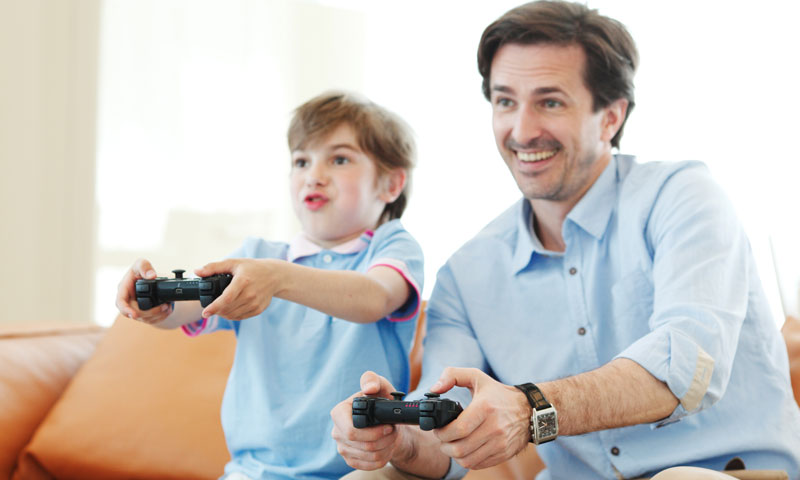There's no doubt that video games are popular among children, teens and adults. The latest games and newest consoles often top wish lists and dominate talk at school and around the dinner table. However, that interest may bring concern to parents who wonder if video games, particularly those that feature violence or fighting, can affect their child's behavior.
Research has been mixed on the connection between gaming and aggressive behavior, but one new international study suggests that yes, violent video games may affect some children's behavior over time. Nicholas J. Westers, Psy.D., ABPP, clinical psychologist at Children's Health℠ and Associate Professor at UT Southwestern, explains that issue is not one size fits all.
"It's hard to establish a clear link between aggressive behavior and video games, but this new study suggests that some young people who play violent video games do demonstrate increased physical aggression over time," Dr. Westers says. "Used responsibly, video games can be a fun and healthy hobby for children and adults. Parents know their children best and need to work together to establish rules for video games."
Dr. Westers explains the connection between video games and behavior and offers advice for encouraging healthy media habits.
Why can video games cause violent behavior?
The most recent research was a large-scale study that synthesized the results of all long-term studies that had monitored children across the globe. Researchers found that some kids may be more likely to exhibit aggressive behavior. However, Dr. Westers reminds parents it is difficult to draw a direct cause and effect between video games and behavior.
One factor that may influence behavior is the tendency of adolescents to model themselves after people or characters with whom they identify. Research has shown that when children and adolescents see individuals they connect with in media – including TV, movies or online – they are more likely to adopt those influencers' opinions and acts. Some believe the same may happen with video games.
How can I encourage healthy gaming behavior?
"The strongest protector against any problematic behaviors or mental health issues is a healthy relationship with parents," Dr. Westers states. "Children feel more comfortable speaking with parents when they have a strong connection and parents are more likely to recognize and empathize with children."
Dr. Westers recommends two simple ways to establish a healthy video game playing behaviors:
1. Establish rules about video game use
"Video games are a privilege, not a right," Dr. Westers says. "Parents need to establish clear and consistent rules around playing games."
Those rules should include:
- When children can play video games
- How long they can play
- Responsibilities that must be completed before playing video games, including homework or chores
- Proper behavior and sportsmanship during play, including how to react to winning and losing
Setting rules around video game play may feel challenging for parents when it's their child's favorite activity. However, these guidelines help prevent a child from playing for too long, which can inadvertently lead to a cycle of lack of sleep, unhealthy eating and overall feelings of unhappiness or depression. Putting a limit on play can also prevent negative effects of video games on behavior. "It's unlikely a child or teenager will set limits for themselves when engaging in a fun activity, especially when it's one they may use as an escape," Dr. Westers says. "They need their parents' help to set limits and learn self-control."
"It's best to establish rules sooner rather than later," Dr. Westers adds. "It's hard to put limits on video games after they've started playing. Parents should also keep in mind the rules apply to them as well, to set an example for their children."
2. Play together and show empathy
"Parental involvement is key across the board when it comes to relationships with children," Dr. Westers says. "That's just as true with video games as it is for anything else. When parents are present and involved, it's easier to talk with children about what they see, and model good behavior. Plus, having a shared interest, like video games, is a great way to bond with your kids."
When playing video games, Dr. Westers recommends parents talk about what's happening in the game and separate it from reality.
"Show empathy," he says. "Talk to your child about how it makes you feel when your character gets hurt or hurts someone else, and compare it to how you would feel in the real world. Remind your child about your values as a family, and say clearly what type of behavior is absolutely off limits in real-life."
Treat video games as you would any other media, and take the opportunity to talk about certain situations and lessons that can be applied, including how you feel when you win or lose.
"Video games elicit a lot of emotions – from excitement to frustration," Dr. Westers says. "Talk about good sportsmanship and how you cope with those feelings – whether that's not being a sore winner or loser, or knowing your limits and when it's time to turn off the game and walk away when you're getting too frustrated."
This relationship helps children learn how to regulate their emotions and apply them to everyday life, and it helps make them more receptive when parents do express their concerns.
"When parents are worried about violence in games, children are more likely to hear them out because it's coming from a place of experience and understanding," Dr. Westers explains. "That doesn't mean they will like it, but they will be more likely to hear you out, especially if you've played with them the very video game about which you're expressing concern."
What warning signs should I be watching for?
Parents know their children best. Dr. Westers encourages parents to talk with their family if they become concerned about video game use or behavior, and look for the following concerns that could become red flags:
- Increased aggression, which could indicate kids learning violence from gaming
- Change in behavior, such as increased social isolation or a decline in grades at school
- Irritability
- Difficulty sleeping
- Increased or peculiar interest in the real-life equivalent of the weapons used in the video game(s)
All of these things could be the effects of video games on behavior.
"In isolation of each other, these signals can mean a lot of different things," Dr. Westers says. "But they shouldn't be brushed off as typical adolescent behavior if they co-occur. Try to talk with your child to see if you can get to the bottom of what's bothering him or her. And if you are still concerned, connect with your child's doctor or a mental health specialist."
Parents can also watch for early signs of video game addiction if they are concerned their child is playing too frequently and it is affecting their behavior.
It's important to encourage healthy video game habits in kids. An expert from @Childrens suggests establishing rules about usage and parental involvement to foster healthy gaming behavior.
Learn more
If you become concerned about your child's behavior or feelings of aggression, loneliness, depression or anxiety, Children's Health psychologists and psychiatrists are here to help. Learn more about programs we offer to support mental, emotional and behavioral health.

Thank you!
You are now subscribed to the Children's Health Family Newsletter.
Children's Health will not sell, share or rent your information to third parties. Please read our privacy policy.
